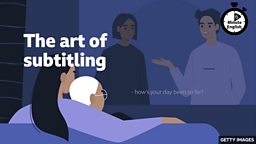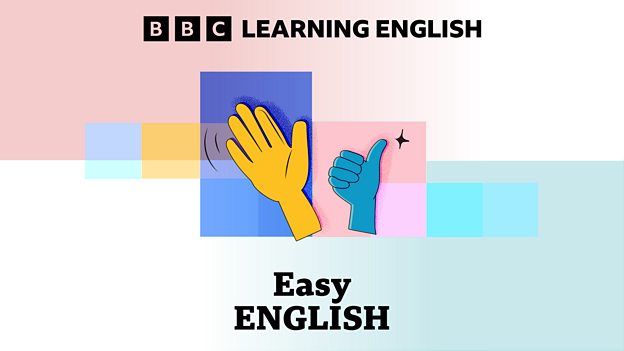6 Minute English
Intermediate level
What's the point of museums?
Episode 230420 / 20 Apr 2023

Introduction
Many museums have been criticised for stealing ancient treasures during imperial times and that these items, such as the famous Parthenon marbles, should be returned. Beth and Neil discuss the controversial role of museums in the 21st Century and teach you related vocabulary.
This week's question
The Natural History Museum in London, features a grand entrance hall which, for decades, contained an impressive life-size model of a dinosaur. But what was this iconic dinosaur's name?
a) Dippy the Diplodocus
b) Terry the Terradactyl
c) Tyrone the Tyrannosaurus
Listen to the programme to find out the answer.
Vocabulary
artefact
object of historical importance or interest, especially one which is very old
hunter-gatherers
people who lived by hunting and collecting food in the wild, instead of by farming crops
(move) up the ladder
advance; make progress
onwards and upwards
becoming better and better; improving
exhibition
display of a collection of artefacts in a museum, or paintings in an art gallery
interconnected
several different things being connected or related to each other
TRANSCRIPT
Note: This is not a word-for-word transcript.
Neil
Hello. This is 6 Minute English from BBC Learning English. I’m Neil.
Beth
And I’m Beth.
Neil
London has many tourist attractions, from Big Ben to Buckingham Palace. Would it surprise you to hear that many tourists’ top destination is actually a museum? The British Museum contains thousands of important artefacts – objects of special historical interest, including ancient Egyptian mummies, an Aztec serpent, and the Rosetta Stone. In fact, London has museums on every subject, from trains to fashion.
Beth
But recently many museums have been criticised for stealing ancient treasures during imperial times – the age of the British empire. Many argue that these treasures, such as the famous Parthenon marbles and Benin bronzes, should be returned. In this programme, we’ll discuss the controversial role of museums in the 21
st
century, and as usual, we’ll be learning some useful new vocabulary as well.
Neil
But first, I have a question for you, Beth. Another of London’s most visited museums, The Natural History Museum, features a grand entrance hall which, for decades, contained an impressive life-size model of a dinosaur. But what was this iconic dinosaur’s name? Was it:
a) Dippy the Diplodocus?
b) Terry the Terradactyl? or,
c) Tyrone the Tyrannosaurus?
Beth
Ah, I think the answer is Dippy the Diplodocus.
Neil
OK, Beth. I’ll reveal the answer later in the programme. Anthropologist, Professor Adam Kuper, has written a new book, The Museum of Other People, which discusses the idea that many museum artefacts were stolen and should be given back. Here he speaks to BBC Radio 4 programme, Thinking Allowed, about two sides of the debate: one which saw European culture as superior, and another which didn’t.
Prof Adam Kuper
These are the two great ideologies of the imperial age. One is that all societies begin from a very rough base… We're all…our ancestors were hunter-gatherers at one stage, and then they go through the stage of farming, industry… all this while they're getting smarter and smarter, their brains are getting bigger and bigger, and they’re moving from primitive magic to sophisticated religion, then maybe on to science. So, it's onwards and upwards. And that's the imperial idea… and we're going to help these other poor benighted people up the ladder with us. And opposed to this there's this other 19 century ideology which says, ‘no, this is an imperialist myth. We have our own culture. There are no better or worse cultures, there are just national cultures’.
Beth
Imperialists believed that mankind progressed through stages, starting as hunter-gatherers – people who lived before the invention of farming, and survived by hunting and collecting food in the wild. According to this view, white European culture was best because it was the most advanced, so it was their duty to help local cultures up the ladder, meaning to advance or make progress. Adam Kuper uses the phrase, onwards and upwards to describe a situation where things are improving, becoming better and better.
Neil
Of course, things didn’t get better for everyone, especially the people whose land and possessions were stolen. An opposing view argued that each culture is unique and should be valued and protected.
Beth
The legacy of colonialism is now being publicly debated, but the question of returning stolen artefacts remains complex. Firstly, since many of these treasures are hundreds of years old, to whom should they be returned? What’s more, the history behind these objects is complicated. In the case of the Benin bronzes, for example, questions can be asked about the actions of local leaders, as well as the European powers.
Neil
So how can museums display their artefacts to reflect this complex history. Here’s Professor Kuper sharing his ideas with BBC Radio 4’s, Thinking Allowed.
Prof Adam Kuper
I want to see a lot more temporary exhibitions and the kinds of exhibitions that I would be interested in are not about one particular tradition, but about the relationships between different cultural traditions. Everything is interconnected. Of course, these connections are sometimes violent, sometimes oppressive, sometimes very difficult, sometimes very painful. But things are changing.
Neil
An exhibition is a display showing a collection of artefacts. Adam Kuper wants exhibitions to tell truthful stories by showing the relationships between cultures, and how events are interconnected – connected or related to each other. And these stories must include all cultures, going back almost to the dinosaurs.
Beth
And speaking of dinosaurs, Neil, it’s time for you to reveal the answer to your question: what was the name of the famous dinosaur which greeted visitors to London’s Natural History Museum? I said it was Dippy the Diplodocus.
Neil
Which was the correct answer! The 26-metre-long dinosaur was displayed from 1905 until 2017 when it was replaced by the skeleton of a female blue whale promisingly named, Hope. OK, let’s recap the vocabulary we’ve learned starting with artefact – anobject of historical significance.
Beth
Hunter-gatherers were people who lived by hunting and collecting wild food rather than farming.
Neil
If someone moves up the ladder, they advance or make progress.
Beth
The phrase onwards and upwards describes a situation where things are getting better and better.
Neil
An exhibition is a display of artefacts in a museum or paintings in an art gallery.
Beth
And finally, the adjective interconnected describes separate things which are connected or related to each other. Once again, our time is up. Join us again soon for more trending topics. Goodbye, everyone!
Neil
Bye!
Latest 6 Minute English

Sexism: Female farmers fighting back
Episode 231228 / 28 Dec 2023
How can female farmers beat rural sexism?



Invasive species: Why don't we eat them?
Episode 231207 / 07 Dec 2023
Could we eat invasive species?

What and where is Little Italy?
Episode 231130 / 30 Nov 2023
Mozzarella, ricotta, cannolis and focaccia... Where are we? Little Italy of course!

Social media and teenage health
Episode 231123 / 23 Nov 2023
What are the health risks of social media for teenagers?








Sounds that make you want to scream
Episode 230928 / 28 Sep 2023
Are there any sounds you find upsetting?




The stories behind our names
Episode 230831 / 31 Aug 2023
What do our names reveal about our culture and family history?


Are you unhappy at work?
Episode 230817 / 17 Aug 2023
Does work leave you feeling bored and exhausted?







Is it wrong to eat plants?
Episode 230629 / 29 Jun 2023
Should we treat plants with the same consideration we treat animals with?



The art of subtitling
Episode 230608 / 08 Jun 2023
Hear how subtitles can help bring TV and movies to life

Ecotourism: good or bad?
Episode 230601 / 01 Jun 2023
We discuss the growing popularity of ecotourism.

Can climate change cause more disease?
Episode 230525 / 25 May 2023
With warming temperatures, mosquitos are now spreading to new areas, including Europe.



Ice and the origins of life on Earth
Episode 230504 / 04 May 2023
We talk about an essential element for life to thrive.

Women in politics
Episode 230427 / 12 Apr 2023
We discuss some of the reasons why women make up only 26% of the world's politicians.

What's the point of museums?
Episode 230420 / 20 Apr 2023
We discuss the role of museums in the 21st century and the items taken from different countries.

How culture affects sadness
Episode 230413 / 11 Apr 2023
What ways do you think culture can influence sadness?

Would you eat a Kalette?
Episode 230406 / 06 Apr 2023
Hear about a new kind of vegetable making an entrance in British kitchens

Do you get jealous easily?
Episode 230330 / 06 Mar 2023
Let's talk about the ugly green-eyed monster


Food and mood
Episode 230316 / 16 Mar 2023
We look at the link between what you eat and how you feel.

How to talk to a climate denier
Episode 230309 / 09 Mar 2023
The dos and don'ts of trying to discuss science with someone who doesn't believe in it

Losing your mother tongue
Episode 230302 / 02 Mar 2023
Hear the story of a woman who replaced her native Czech for English.

The health benefits of apples
Episode 230223 / 23 Feb 2023
Could 'an apple a day keep the doctor away'?


Doomscrolling: Why do we do it?
Episode 230209 / 27 Jan 2023
What is doomscrolling and why are we attracted to bad news? Listen to find out!

Exercise for the lazy
Episode 230202 / 22 Jan 2023
What's the least amount of exercise you should do to stay healthy?

Can AI have a mind of its own?
Episode 230126 / 26 Jan 2023
Hear about the software engineer who became 'friends' with his computer

Climate change: Are there too many people?
Episode 230119 / 13 Jan 2023
Does the size of your carbon footprint depend on where in the world you were born? Listen to find out!

The hidden life of buffets
Episode 230112 / 12 Jan 2023
Neil and Sam discuss buffet meals and the history behind them.

Songwriting
Episode 230105 / 05 Jan 2023
Writing a memorable song isn't easy. So is there an art to good songwriting?







